Home Tags Posts tagged with "cuba"
cuba
Airbnb has decided to add Cuba to its list of destinations.
More than 1,000 properties in Cuba are already listed, but can only be booked by users in the US.
The home holiday rental site is restricted from showing the listings elsewhere because of a US trade embargo against Cuba.
Nevertheless, Airbnb said Cuba could eventually become one of its biggest markets in Latin America.
“We are actually plugging into an existing culture of micro-enterprise in Cuba,” said the company’s regional director Kay Kuehne.
“The hosts in Cuba have been [renting out rooms to travelers] for decades.”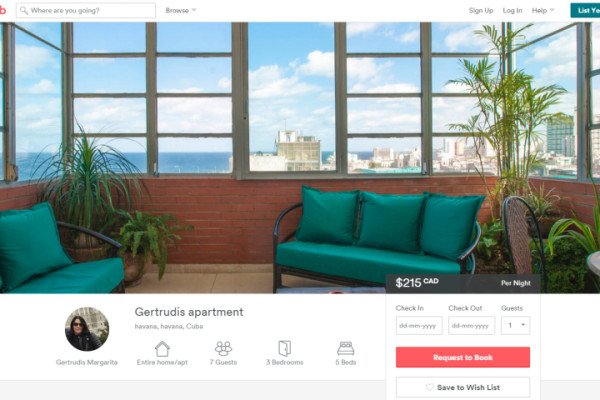
The initial listings range from $15 a night for a private room in Trinidad to $1,100 a night for the whole of a five-bedroom “chalet” in Havana.
Airbnb visitors outside the US can view the listings, but can only add them to their wish lists, rather than book them. An on-screen alert states that the site is not licensed to provide booking services to others.
The US recently began allowing Americans to travel to Cuba if they obtained a special license, which can be granted for activities including family visits, educational activities and public performances.
The White House said it would like tourism to be added to the list, and President Barack Obama has urged Congress to begin work to drop the wider sanctions.
Visitors across the globe can still find listings for Cuba-based rooms via other US services, including TripAdvisor, which allows users to contact hosts directly but does not take a cut of the bookings itself.
[youtube zhGiWyyDtvw 650]
Fidel Castro’s revolutionary lover, Natalia Revuelta, has died at the age of 89 in Havana.
Natalia Revuelta, a Cuban socialite, emptied her bank account and sold her jewelry to support Fidel Castro when he was planning his insurgency.
She caught the eye of Fidel Castro when he was a young revolutionary in 1952.
Fidel Castro used her home for meetings when he was plotting the start of the revolution.
They later had an affair that produced a daughter, Alina, but they never married.
Natalia Revuelta, known as Naty Revuelta, was considered one of the most beautiful women in Cuba.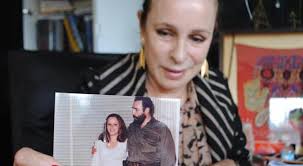
Blonde and green-eyed, Natalia Revuelta was a noticeable figure in Havana’s social scene when she met Fidel Castro in 1952.
She was married at the time to a heart surgeon nearly twenty years her senior but observers said she appeared to have had an appetite for revolution and adventure.
Natalia Revuelta allowed Fidel Castro to use her home for meetings when he was beginning to plot his insurgency.
She handed over all her savings to support Fidel Castro’s movement and later pawned her sapphires, emeralds and diamond jewelry for his cause.
The couple never married and Fidel Castro initially refused to recognize his daughter.
When he did, the girl was 12 years old and struggled to reconcile with her natural father.
In 1993, Alina Fernandez Revuelta left Cuba disguised as a Spanish tourist to live in the US.
Although Natalia Revuelta had little contact with Fidel Castro once their affair was over, she remained in Cuba holding various government jobs.
In an interview Naty Revuelta once said she was never bitter that Fidel Castro put his revolutionary project first. She also said: “It took years to get him out of my heart.”
Fidel Castro had many out-of-wedlock affairs – one, briefly, with the famous Ava Gardner and others with not-so-famous beauties such as Marita Lorenz. But the most fascinating, by far, was the one with Naty Revuelta because it is that prism that provides the deepest insight into the historic figure known as Fidel Castro.
Netflix has launched its services in Cuba, as diplomatic relations between the US and the communist island continue to thaw.
The internet movie and television streaming service said its content, such as series House of Cards and Orange is the New Black, will be available to anyone with international payment cards.
On January 15, the US announced new rules that ease long-running sanctions against Cuba.
A trade embargo has been in place since 1962.
MasterCard and American Express have both said they will launch operations in Cuba soon.
Last month, Netflix said its international expansion was proceeding ahead of schedule.
The company said it plans to expand to 200 countries in the next two years, and to earn “material profits” from its operations overseas by 2017.
“We are delighted to finally be able to offer Netflix to the people of Cuba, connecting them with stories they will love from all over the world,” said Netflix co-founder and CEO Reed Hastings in a statement.
“Cuba has great filmmakers and a robust arts culture and one day we hope to be able to bring their work to our global audience of over 57 million members.”
[youtube ThzjNPIOKug 650]
Cuba’s President Raul Castro has stressed that Havana will not change its political system after recent US move to normalize bilateral relations.
Raul Castro also warned that Cuba faced a “long and difficult struggle” before the US removed its economic embargo.
On December 17, President Barack Obama announced a “new chapter” in US ties with communist-run Cuba.
He said the changes were the “most significant” in US policy towards Cuba in 50 years.
US-Cuba relations have remained frozen since the early 1960s, when the US broke off diplomatic relations and imposed a trade embargo after Cuba’s revolution.
Speaking in the National Assembly in Havana, President Raul Castro said this week’s announcement by Barack Obama removed an “obstacle” in bilateral relations.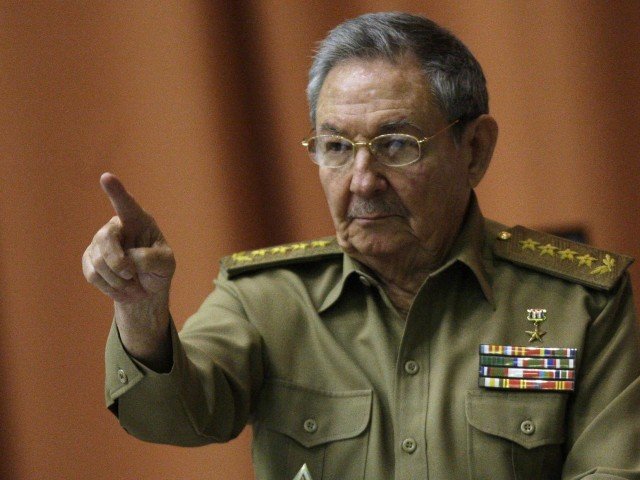
Raul Castro, the brother of former leader Fidel Castro, said he was open to discussing a wide range of issues with Washington, but stressed that Cuba would not give up its socialist principles.
“In the same way that we have never demanded that the United States change its political system, we will demand respect for ours.”
Raul Castro added that Cuba had to go through a “long and difficult struggle” before the decades-old US economic embargo would be lifted.
Announcing the normalization of diplomatic and economic ties, President Barack Obama said Washington’s approach towards Cuba was “outdated”.
As part of the deal, US contractor Alan Gross and an unnamed intelligence officer loyal to the US were released from Cuban prison in return for three Cubans held in the US.
Barack Obama also said he wanted to reopen a US embassy in Havana in the coming months.
[youtube GHxorrbTVXU 650]
Congressmen who are against President Barack Obama’s new Cuba policy have threatened to block his efforts to restore diplomatic relations after 50 years of hostility.
Florida Senator Marco Rubio promised on CNN to block the nomination of any US ambassador to Cuba.
Other anti-Castro legislators suggested Congress would removing funding for any normalized ties with the country.
US-Cuban ties have been frozen since the early 1960s – a policy of isolation Barack Obama condemned as a failure.
On December 17, President Barack Obama said it was time for a new approach.
As part of the deal, US contractor Alan Gross, 65, and an unnamed intelligence officer loyal to the US were released from Cuban prison in return for three Cubans held in the US.
The US will now seek to set up an embassy in Cuba, expand US visitors to Cuba, open up banking and increase caps on how much cash Cubans can post to relatives on to the island.
Only Congress has the power to end the full trade embargo, and with many Republicans deeply opposed to such a change, correspondents say it is unlikely to happen soon.
Among those opposed to restoring diplomatic relations was Democratic Senator Robert Menendez who said he was “deeply disappointed”.
“It’s a fallacy to believe that Cuba will reform because an American president opens his hands and the Castro brothers will suddenly unclench their fists.”
Fellow Senator Lindsey Graham, a Republican, said he would be among those trying to pass legislation to undercut funding for policy changes, including setting up an embassy.
“Normalizing relations with Cuba is a bad idea at a bad time,” tweeted Lindsey Graham, who will become chairman of a committee that determines state department funding in January.
Republican Senator Marco Rubio slammed the deal as “inexplicable”.
“Appeasing the Castro brothers will only cause other tyrants from Caracas to Tehran to Pyongyang to see that they can take advantage of President Obama’s naiveté during his final two years in office,” Marci Rubio said in a statement.
Marco Rubio told CNN on Wednesday he reserved the right “to do everything within the rules of the Senate to prevent that sort of individual from ever even coming up for a vote,” referring to the confirmation process for ambassadors in relation to Cuba.
Their objections mirror the concerns of some dissident Cubans living in the US.
“It is a betrayal. The talks are only going to benefit Cuba,” Carlos Munoz Fontanil said at a protest in Miami’s Calle Ocho.
Meanwhile, other world leaders have welcomed the move.
Leading the praise, Pope Francis sent “warm congratulations” to Barack Obama and Cuban President Raul Castro for overcoming “the difficulties which have marked their recent history”.
The announcement followed more than a year of secret talks in Canada and at the Vatican, directly involving the pontiff.
The EU, which is in the process of normalizing ties with Cuba, described the move as a “historical turning point”, while leaders meeting at a Latin America summit in Argentina broke into applause at the news.
Canadian PM Stephen Harper, whose country never broke off ties with Cuba, welcomed what he called the “overdue development”.
Officials said that Barack Obama and Raul Castro spoke by telephone on December 16 for nearly an hour – the first presidential-level talks between the two nations since Cuba’s 1959 revolution.
In exchange for Alan Gross, who was in poor health, and the unnamed intelligence officer, Washington released three members of the so-called “Cuban Five” who were serving lengthy sentences for espionage.
Alan Gross’s five-year imprisonment had undermined previous attempts to thaw diplomatic relations between the two countries.
[youtube pyw1iKif9Zs 650]
[youtube OyjzLdu3ggY 650]
The US historic move to end more than 50 years of hostility towards Cuba and restore diplomatic relations has been welcomed by world leaders.
Pope Francis joined leaders from Latin America and Europe in praising the “historic” deal which saw the release of prisoners from both countries.
However, dozens of dissident Cubans oppose the move, which some Republicans have labeled a “retreat” by the US.
US-Cuban ties have been frozen since the early 1960s.
President Barack Obama said the “rigid and outdated policy” of isolating Cuba since then had clearly failed and that it was time for a new approach.
President Raul Castro, meanwhile, has urged the US to ends its trade embargo, which has been in place since the Cuba turned to Communism more than 50 years ago.
Power to lift the embargo, which Raul Castro says has caused “enormous human and economic damage”, lies with the US Congress, and correspondents say many Republicans are still deeply opposed to this.
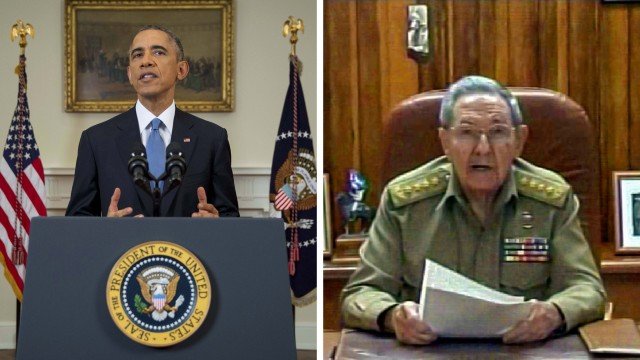
Photo Getty Images
Leading the praise, Pope Francis sent “warm congratulations” to Barack Obama and Raul Castro for overcoming “the difficulties which have marked their recent history”.
The announcement followed more than a year of secret talks in Canada and at the Vatican, directly involving the pontiff.
The EU, which is in the process of normalizing ties with Cuba, described the move as a “historical turning point”, while leaders meeting at a Latin America summit in Argentina broke into applause at the news.
Chilean Foreign Minister Heraldo Munoz hailed it as “the beginning of the end of the Cold War in the Americas”.
Venezuela’s President Nicolas Maduro, whose predecessor Hugo Chavez was a close ally of Fidel Castro, said it was a “moral victory” and “victory for Fidel”.
Former US Secretary of State Hillary Clinton said increased US engagement in Cuba in the future should “encourage real and lasting reforms for the Cuban people”.
Canadian PM Stephen Harper, whose country never broke off ties with Cuba, welcomed what he called the “overdue development”.
However, the move was not applauded by everyone, with dozens of Cubans living in exile in the US state of Florida protesting after the announcement on December 17.
Meanwhile, Republican Senator Marco Rubio slammed the deal as “inexplicable”, adding that it did nothing to address the issues of Cuba’s political system and human rights record.
As part of the deal, US contractor Alan Gross, 65, was released from Cuban prison in return for three Cubans held in the US.
President Barack Obama said the US was looking to open an embassy in Havana in the coming months.
Officials said that Barack Obama and Fidel Castro spoke by telephone on December 16 for nearly an hour – the first presidential-level talks between the two nations since Cuba’s 1959 revolution.
In exchange for Alan Gross, who was in poor health, and an unnamed American intelligence officer, Washington released three members of the so-called “Cuban Five” who were serving lengthy sentences for espionage.
Alan Gross’s five-year imprisonment had undermined previous attempts to thaw diplomatic relations between the two countries.
[youtube lwo6Ec6Dgkk 650]
American Alan Gross has been released from a Cuban prison after a deal agreed by the US and Cuba, US officials have announced.
Alan Gross, 65, was accused of helping to hook people up to the internet illegally on the communist island and spent 5 years in prison.
He left Cuba on a US government plane and was freed on humanitarian grounds, a US official told Associated Press.
His arrest and imprisonment has undermined attempts to thaw diplomatic relations between the two countries.

Photo AP
Alan Gross was jailed for 15 years for committing “acts against the integrity of the state”.
His work in building internet access for local communities involved bringing in satellite equipment that is illegal in Cuba.
The Cuban authorities saw Alan Gross’ activities as a covert attempt at regime change, although Washington protested his innocence.
[youtube 98uyL9h74JA 650]
Cy Tokmakjian, the president of a Canadian transport company, has been sentenced by a Cuban court to 15 years in jail for bribery.
Cy Tokmakjian, 74, was detained in Cuba in 2011 as part an anti-corruption operation. He denies the charges.
The Tokmakjian Group said the court had seized its assets in Cuba, worth about $100 million.
The company said the ruling was worrying development for potential investors on the Communist-run island.
“Lack of due process doesn’t begin to describe the travesty of justice that is being suffered by foreign businessmen in Cuba,” the company said in a statement.

Cy Tokmakjian was detained in Cuba in 2011 as part an anti-corruption operation
Two other executives from the Tokmakjian Group – fellow Canadian citizens Claudio Vetere and Marco Puche – were sentenced to eight and 12 years in prison.
The Ontario-based company used to sell transportation, mining and construction equipment to Cuba.
There has been no comment on the case from the Cuban authorities.
Its offices in Havana were seized in 2011 when President Raul Castro launched a major drive against corruption in the Caribbean nation.
Canadian lawmaker Peter Kent visited Cy Tokmakjian in jail last year.
“The trial was, from almost any measure, extraordinarily unfair and rigged,” Peter Kent told the Financial Post newspaper.
The Tokmakjian Group was the sole representative of South Korean company Hyundai in Cuba, which has been making efforts to replace its ageing car and bus fleet.
The company has launched claims worth more than $200 million against Cuba through the International Chamber of Commerce in Paris and Canada’s Ontario Superior Court.
The Cuban government has said it will take disciplinary action against state-owned pharmaceutical company Labiofam that created perfumes named Ernesto Che Guevara and Hugo Chavez.
In a statement in the official Granma newspaper, the government described the project as “a serious error”.
“The symbols of the Revolution are and will always be sacred,” the statement read.
The colognes – Ernesto and Hugo – were unveiled on September 25 by state laboratory Labiofam in the capital, Havana.
Labiofam said Ernesto, the cologne named after the Argentine-born revolutionary who help Fidel Castro take over in Cuba in 1959, would be a woodsy and refreshing citric scent with notes of talcum powder.
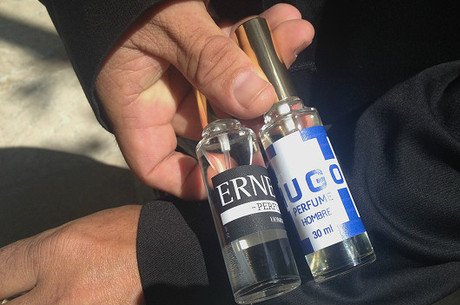
Ernesto and Hugo perfumes were unveiled on September 25 by state laboratory Labiofam in Havana
Hugo, named after the late Venezuelan president, would offer a softer, fruitier fragrance with hints of mango and papaya.
“They will be very attractive colognes, but the names also mean a lot to us,” said Isabel Gonzalez, vice-president for research and development for Labiofam during the launch.
However, the project was mocked in the social networks and criticised by supporters of the Cuban Revolution, who considered it disrespectful.
Labiofam had been in the process of developing stylized bottles and labels for the products before putting them on sale in Cuba and overseas.
“We didn’t want to create propaganda, but rather pay homage to them and help their names endure,” said on September 25 Cuban biochemist Mario Valdes, who led the scent design team.
Labiofam said it had obtained the agreement of the families of Che Guevara and Hugo Chavez to use their names in the colognes. But that has now been denied by the Cuban government.
“The details of this irresponsible action were discussed in detail on Friday with the company’s director and the employees who presented the products, which were still being developed,” read the statement of the Executive Committee of the Ministers’ Council, headed by Cuban President Raul Castro.
“The appropriate measures will be taken to deal with this serious error.
“Such initiatives will never be accepted either by our people or by the Revolutionary Government.”
[youtube 8eR9WW-guks 650]
President Vladimir Putin has denied reports that Russia made a deal with Cuba to reopen an electronic listening post on the Caribbean island.
The Lourdes base near Havana was used by the Soviets to spy on the US during the Cold War.
Speaking at the BRICS summit in Brazil, Vladimir Putin said Russia could “meet its defense needs without this component”.
Russia’s Kommersant newspaper had earlier reported that Russia and Cuba had agreed to reopen the spy facility.
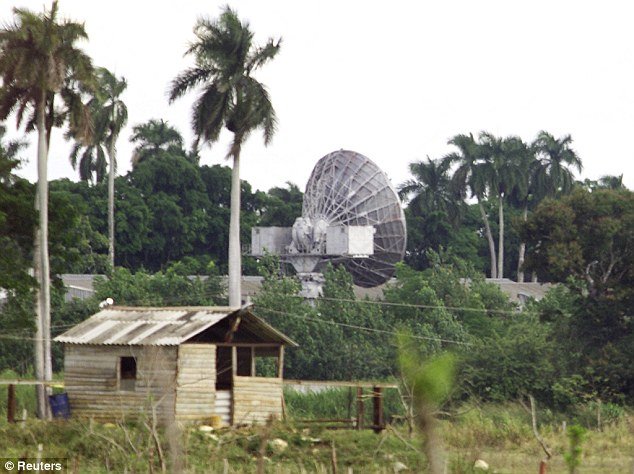
The Lourdes base near Havana was used by the Soviets to spy on the US during the Cold War (photo Reuters)
Vladimir Putin closed the base in 2001, citing concerns over its cost.
The paper said the deal to make the base operational again had been reached during Vladimir Putin’s visit to Cuba last week.
A Russian security source quoted by Reuters news agency had confirmed the Kommersant report, saying “a framework agreement” had been agreed.
The Lourdes base began operations in 1967 and provided intelligence for Soviet state security bodies. It also handled secret communications for the Soviet navy.
In Soviet times some 3,000 specialists worked there, then in the 1990s Russia reduced the staff by about half. Kommersant said staffing on that level would not be required now, because of improvements in technology.
When Russia shut the base in 2001 the annual cost – the rent paid to Cuba – was $200 million.
Cuba was a Cold War hotspot. The crisis over Soviet missiles in Cuba in 1962 almost escalated into nuclear war.
Cuban opposition activist group “Ladies in White” says dozens of its members were detained during a protest march.
The women, who were freed after several hours, were marking the deaths of 37 people who drowned while fleeing the island 20 years ago.
The government has always denied the group’s allegation that the authorities deliberately sunk a tugboat in 1994.
For 10 years, Ladies in White members have defied a protest ban on the Communist island by marching every week, dressed in white.
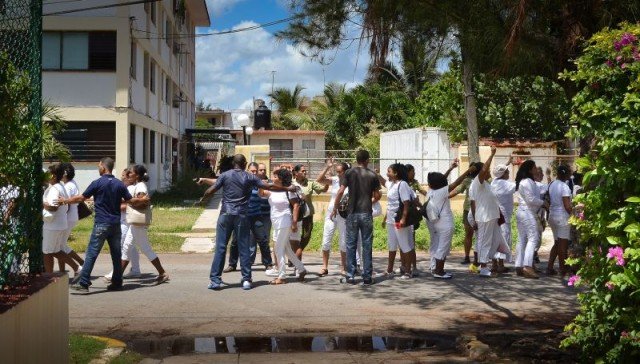
Ladies in White members were detained during a protest march in Cuba (photo AFP)
The group says its members were rounded-up by police on Sunday, as they tried to divert from their normal protest route in the capital, Havana.
More than 90 of them were bundled into buses off the city’s smart 5th Avenue as they headed towards the seafront, they say.
The women were planning to lay flowers in memory of the adults and children who died when the tugboat they had hijacked sank as it was pursued by the Cuban authorities in Caribbean waters.
Dissident groups allege the vessel was rammed and flooded with water cannon, but the government has always maintained the sinking was an accident.
The women are routinely detained and their protests broken up, but these days their march attracts minimal public interest.
However, the group’s members say their protests have produced results, with all 75 political prisoners they have campaigned for now free.
The Cuban authorities say the “Ladies in White” are in the pay of the US and form part of Washington’s “decades-old effort to undermine Cuba’s socialist revolution”.
[youtube 4vWNAHLOzVk 650]
President Vladimir Putin has begun his Latin American tour by visiting Cuba, in an apparent bid to seek allies to counter US and Western influence.
The Russian president’s choice of first stop, Cuba, is seen as an attempt to further boost friendly ties with the one-time Soviet ally.
Russia confirmed cancellation of 90% of Cuba’s debt two days before the visit.
Vladimir Putin will also travel to Argentina and Brazil, where he will attend the football World Cup final on Sunday as leader of the next host nation.
Later he will attend a summit of the BRICS (Brazil, Russia, India, Chinas and South Africa) emerging economies in the Brazilian city of Fortaleza.
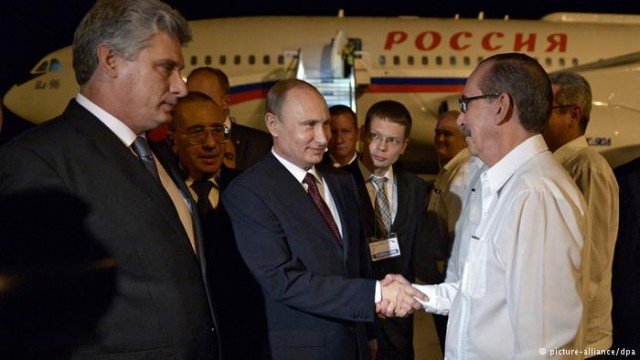
Vladimir Putin has begun his Latin American tour by visiting Cuba (photo picture-alliance/dpa)
In an interview on the eve of the trip, Vladimir Putin said Brazil was one of a group of emerging countries who should play a greater role on the world stage.
“This powerful and fast-developing country is destined to play an important role in the emerging polycentric world order,” he said, adding that Russia would back Brazil’s bid for a permanent seat on the United Nations Security Council.
Analysts say Vladimir Putin is trying to encourage Latin American countries to challenge Western dominance in the world at a time when Russia is isolated by sanctions over Ukraine and relations with the West are at their lowest since the Cold War.
In Cuba, Vladimir Putin is expected to meet President Raul Castro and his predecessor and brother Fidel.
They will be expected to discuss the progress of an agreement signed last year which cancels 90% of Cuba’s $35.2 million Soviet-era debt to Russia and channels the remaining 10% into joint investment projects in the country.
The deal was ratified by the upper house of the Russian parliament on Wednesday.
Relations between Cuba and Russia declined after the collapse of the Soviet Union in 1991 but have improved in recent years.
Russia is involved in oil exploration offshore and began drilling a development well last year.
Vladimir Putin said Russian companies were interested in investing in reinforced plastic products, car parts and heavy equipment for the railway industry.
[youtube op-hFGh0NWw 650]
BNP Paribas has agreed to a record $9 billion settlement with US prosecutors over allegations of sanctions violations.
As part of the deal, France’s largest bank will plead guilty to two criminal charges of breaking US sanctions against trade with Sudan, Iran and Cuba.
The bank will also be prevented from clearing certain transactions in US dollars for one year from the start of 2015.
The settlement is the largest for such a case in US history.
“Between 2004 and 2012, BNP engaged in a complex and pervasive scheme to illegally move billions through the US financial system,” said US Attorney General Eric Holder in a press conference.
In doing so, BNP Paribas “deliberately and repeatedly violated longstanding US sanctions”, he said.
Eric Holder added that he hoped the settlement would serve as a warning to other companies that did business with the US that “illegal conduct will simply not be tolerated”.
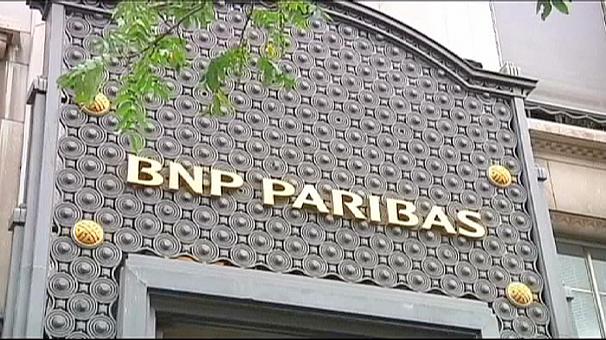
BNP Paribas has agreed to a record $9 billion settlement with US prosecutors over allegations of sanctions violations (photo Euronews)
As part of its agreement with US authorities, BNP agreed to fire and not re-hire 13 individuals who were associated with the sanctions violations.
BNP said as a result of the fine it would take an “exceptional charge” of 5.8 billion euros ($7.8 billion) in the second quarter of this year.
It said this was on top of the $1.1 billion it had already set aside to cover the cost of the US penalties.
However it said it expected “no impact on its operational or business capabilities”, and said it would post “solid results” for the second quarter.
BNP chief executive Jean-Laurent Bonnafe said resolving the issue was “an important step forward” for the bank.
“We deeply regret the past misconduct that led to this settlement,” he added.
In a conference call on Tuesday morning, Jean-Laurent Bonnafe explained that during the year in which the bank was banned from dollar clearing – converting payments from foreign currencies into US dollars – it would engage a third party to carry out the transactions.
Jean-Laurent Bonnafe added that as part of the settlement BNP Paribas would be able to keep its license to operate in the US.
The Swiss financial regulator, FINMA, also announced that it had closed its investigation into BNP Paribas operations in the country, following the US authorities’ decision.
FINMA said in a statement that BNP Paribas had “persistently and seriously violated its duty to identify, limit and monitor the inherent risks” relating to foreign transactions.
Shares in BNP Paribas rose more than 3% in morning trading, following assurances that the bank could weather the $9 billion fine.
France has been pressing the US over the size of the fine, which almost equals BNP’s entire 2013 pre-tax income of about 8.2 billion euros ($11.2 billion).
[youtube RwvQZg3icuo 650]
French banking giant BNP Paribas has agreed to pay an $8.9 billion fine for allegedly violating US sanctions rules, reports suggest.
The bank will also, unusually, admit guilt, Financial Times and The New York Times reported.
According to the Wall Street Journal, BNP plans to slash its dividends and issue billions of euros of bonds to pay the fine.
The bank is accused of breaking sanctions against Iran, Sudan and Cuba.
This is alleged to have taken place between 2002 and 2009.
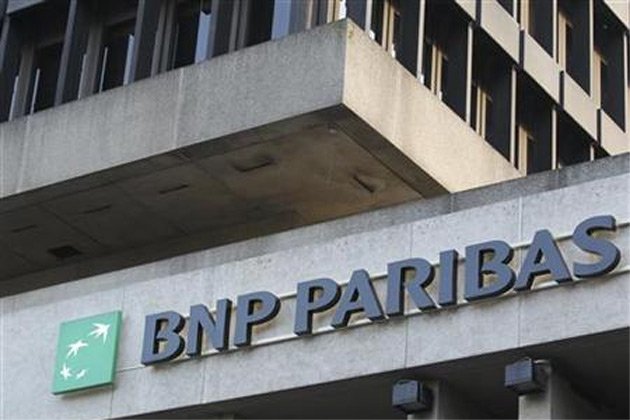
BNP Paribas has agreed to pay an $8.9 billion fine for allegedly violating US sanctions rules
The reported size of the fine could almost wipe out BNP’s entire 2013 pre-tax income of about $11.2 billion.
In April, BNP Paribas said it had set aside $1.1 billion to cover the cost of US penalties, but warned that the “amount of the fines could be far in excess of the amount of the provision”.
Earlier this month, one of the EU’s top officials intervened in the controversy.
Michel Barnier, the EU’s internal markets commissioner, said any penalty on the giant French bank must be “fair and objective”. Reports at the time suggested the fine would be in the region of $10 billion.
France’s President Francois Hollande has raised the matter with President Barack Obama, while French Foreign Minister Laurent Fabius recently warned that such a fine could hurt EU-US trade treaty talks.
As part of the deal with US authorities, BNP may be suspended from converting foreign currencies into dollars, reports suggest, which would hit its ability to operate in international wholesale banking markets.
US authorities are keen to make an announcement on the settlement on Monday afternoon.
[youtube L8lvJlALBxU 650]
Six cases of the mosquito-borne chikungunya virus have been confirmed in Cuba, health authorities say.
Cuba is the latest Caribbean nation to confirm cases of the virus, which resembles dengue fever and can cause high fever, skin rash and joint pain.
According to the Pan American Health Organization, there had been 4,600 confirmed and 166,000 suspected cases in the Caribbean as of mid-June.
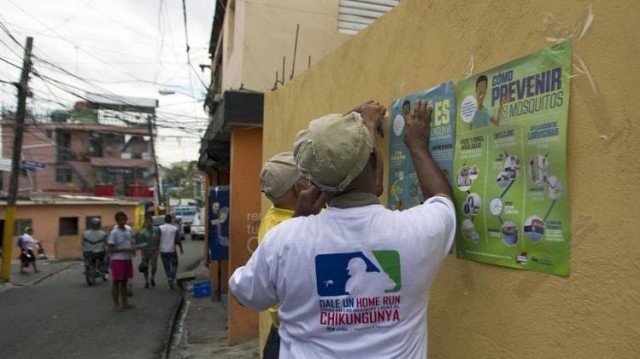
Six cases of the mosquito-borne chikungunya virus have been confirmed in Cuba
There is currently no vaccine or treatment for chikungunya.
The Cuban health ministry said those affected had recently travelled to Haiti or the Dominican Republic, where thousands of people have reported suffering from the severe headaches, high fever and intense joint pain symptomatic for the virus.
Officials said they would “strengthen surveillance and control measures of travelers arriving from countries at risk of the disease, mainly in the Caribbean”.
The virus has long been present in Africa and Asia but it was only detected in the Caribbean in December.
On Wednesday, the Central American nation of El Salvador put seven municipalities on alert after its first cases were confirmed.
The virus is also spreading quickly in the Dominican Republic and Haiti, and there have been confirmed cases in most of the Caribbean island states.
[youtube Js3YrdlRQLw 650]
An American Chamber of Commerce delegation has begun its first visit to Cuba in 15 years.
Chamber president Thomas Donohue said he was in Cuba to assess the economic changes taking place under President Raul Castro.
The US imposed an embargo on the communist-run island more than 50 years ago following the triumph of the Cuban Revolution.
Members of the Cuban community in the US have criticized the visit.
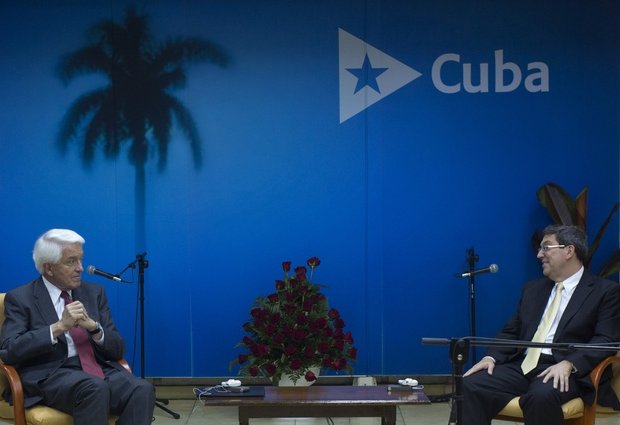
American Chamber of Commerce President Thomas Donohue arrived in Cuba to assess the economic changes taking place under President Raul Castro (photo AP)
They accuse Raul Castro’s government of arresting political opponents and violating basic human rights.
Cuban-American Senator Robert Menendez said political opponents continued to be arrested “without justification,” in Cuba.
“Such conditions hardly seem an attractive opportunity for any responsible business leader,” Robert Menendez told the AP news agency.
Members of the trade delegation told AP that they were in Cuba to assess the trade possibilities in a post-embargo scenario.
However, the vast and politically-active Cuban community in the US has been strongly opposed to any change to trade ties with the communist-run island.
Since Fidel Castro handed power to his brother Raul in 2006, Cuba’s communist government has introduced a number of economic reforms.
Cubans are now allowed to own small businesses and to buy and sell cars and properties.
“We are very pleased to be here. We are learning a lot about the changes taking place in Cuba,” said Thomas Donohue.
He said that Cuba is now “fundamentally different in terms of the number of people that are operating under the private system”.
In December, President Raul Castro called for “civilized relations” with the US, saying the two countries should respect their differences.
The US should drop its demand for regime change and allow both sides to continue work on improving relations, Raul Castro said.
The US Chamber of Commerce delegation was welcomed to Havana on Tuesday afternoon by Foreign Minister Bruno Rodriguez and Trade Minister Rodrigo Malmierca Diaz.
Cuba’s National Assembly has passed a new foreign investment law on Saturday that aims to make the Communist-run island more attractive to foreign businesses.
The law slashes taxes on profits from 30% to 15% and gives new investors eight years of exemption from paying taxes.
The change is seen as a key part of President Raul Castro’s reform package, aiming to modernize Cuba’s economy.
The government in Havana opened the country to foreign capital in 1995.
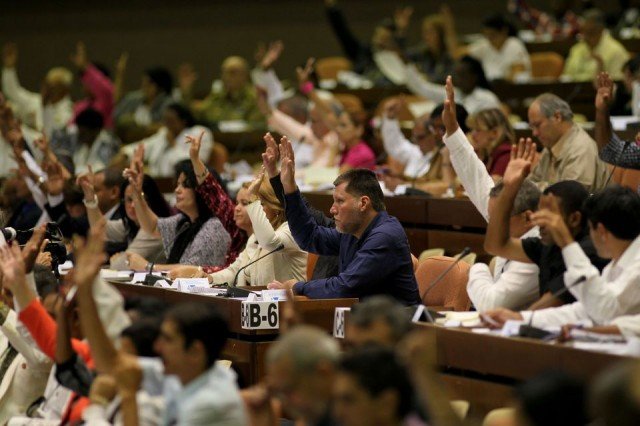
Cuba’s National Assembly has passed a new foreign investment law that aims to make the country more attractive to foreign businesses
However, in recent years, Cuba has seen a fall in foreign investment and moderate economic growth. The economy grew by 2.7% in 2013, well below the government’s 7% target.
Cuba’s economy is seen as highly centralized and inefficient, but almost 500,000 Cubans now have licenses to operate small, private businesses.
Presenting the law at a special televised session of the assembly, ministers were at pains to stress that the government was not “selling” the country but taking steps to ensure its prosperity as a socialist state.
The text of the bill has not yet been released but is expected to introduce several incentives to investment when it comes into force in three months’ time:
- Investors will be lured into joint ventures with the state and Cuban companies
- The process of approving foreign investment will be speeded up
- Legal protection will aim to reinforce investors’ confidence in the Communist government
- Taxes will be cut to 15% on profits in most areas, although special conditions will be set for investment in natural resources
- Tax on nickel and fossil fuel investment could be as high as 50%
The reform is not expected to attract investment from the large Cuban community in the US, under the 50 year-old US economic embargo.
[youtube JLrQvVtU-bM 650]
Cuba has suspended its consular services in the US after the American bank M&T decided to withdraw its facilities.
The Cuban government says it will not be able to renew passports and process visas unless it finds an alternative to the M&T bank.
The M&T bank said its decision was taken for business reasons.
The move is likely to prevent tens of thousands of people travelling from the US to Cuba every month and could have a big impact on the economy there.
The US broke off diplomatic relations with Cuba in 1961 and imposed an economic embargo a year later.
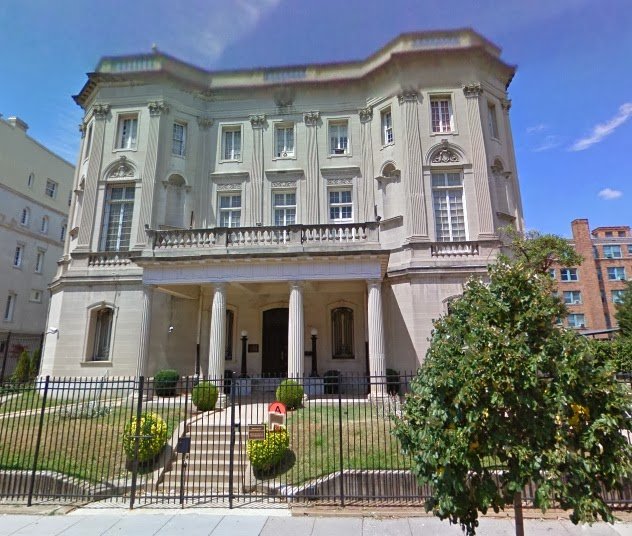
Cuba has suspended its consular services in the US after the American bank M&T decided to withdraw its facilities
In the absence of bilateral contacts, consular services have been handled by the Cuban Interests Section in Washington.
In a statement, the Cuban government blames the trade embargo for its failure to find a new bank “in spite of huge efforts made”.
The M&T bank announced last year that it would stop accepting deposits from February 17, which is a public holiday in the US.
“The section regrets any inconvenience this situation may cause,” read the statement.
The bank says it will only be able to handle “humanitarian cases”.
More than 40,000 people on average travel to Cuba from the US every month, most of them Cuban-Americans, according to the Miami-based Havana Consulting Group.
Americans who do not have Cuban nationality are also allowed to travel if they are taking part in cultural exchange programs.
Cuba and the US announced the resumption of official talks on immigration and postal services between the two countries.
Earlier this week, the EU agreed to open negotiations aimed at restoring full relations with Cuba.
The EU has agreed to open negotiations with Cuba aimed at restoring full bilateral relations with the Communist-run island.
The talks, which could begin as soon as next month, will try to increase trade and investment, and include a dialogue on human rights, officials said.
Since 1996, the EU has restricted its ties with Cuba to encourage multi-party democracy and progress on human rights.
The bloc is Cuba’s second-biggest trading partner after Venezuela.
It represents a major source of investment, and hundreds of thousands of European tourists visit the island every year.
EU foreign policy chief Catherine Ashton stressed that human rights remained “at the core” of its dealings with Cuba.
“These negotiations will help consolidate our engagement with Cuba,” Catherine Ashton said.
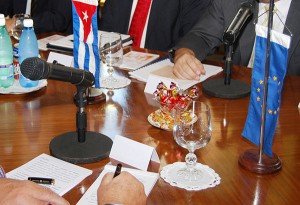
Since 1996, the EU has restricted its ties with Cuba to encourage multi-party democracy and progress on human rights
“I hope Cuba will take up this offer.”
The announcement comes with Cuba engaged in an economic and social reform process launched by President Raul Castro.
The EU ambassador to Havana, Herman Portocarero, said the aim was to support and accompany “change on the island” while also promoting human rights.
A legal bilateral relationship would bring “more opportunities”, he added.
The move indicates the most important diplomatic shift since the EU lifted sanctions against Cuba in 2008.
It follows the visit by Dutch Foreign Minister Frans Timmermans to Cuba in January. During his trip, Frans Timmermans called on the EU to change its policy toward the island.
He said the best way to promote change was through dialogue, not isolation.
In 1996, the EU agreed on a set of rules governing its relations with Cuba, called the Common Position.
It states that the EU’s objective is “to encourage a process of transition to a pluralist democracy and respect for human rights and fundamental freedoms, as well as sustainable recovery and improvement in the living standards of the Cuban people”.
Despite the policy, more than half of EU member states have bilateral agreements with Cuba.
Cuba has rejected the Common Position, arguing that it constitutes an interference in its internal affairs.
The US is “very open” to building a new relationship with Cuba, a senior American official has said.
However, Edward Alex Lee of the US state department stressed that any improvement should go hand-in-hand with more political freedom on the communist-run island.
Edward Alex Lee said the two countries had held “very constructive” talks on migration and other issues this week.
But he declined to give any details of what he called “substantial progress”.
Edward Alex Lee, who has been on an official visit to Cuba, added the two nations would seek to continue these rare negotiations.
“Despite our historically difficult relationship…we have been able to speak to each other in a respectful and thoughtful manner,” he told a news conference in Havana.
However, he added that the US wanted a “fundamental change” in the Cuban government’s attitude towards its own people.
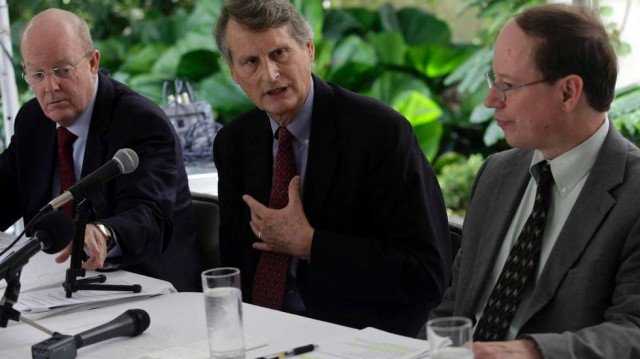
Edward Alex Lee said the US and Cuba had held “very constructive” talks on migration and other issues
“We want to have that opening reflect – from the Cuban side – a respect for Cubans to express themselves freely, to be able to petition their government with grievances without the danger of arrest.”
Talks between the US and Cuba were suspended in 2011 but resumed last July.
The main focus of the latest talks was migration: discouraging Cubans from risking their lives at sea to reach the US, by ensuring that there were safe and legal alternatives.
The US and Cuba cut formal diplomatic ties more than five decades ago.
The talks, which took place in Havan, were also centered on other topics of mutual interest, including aviation safety, co-operation in counter-narcotics work, protocols on preparing for oil spills, search-and-rescue work, and renewing postal services between the two neighbors.
They came after the first handshake between President Barack Obama and his counterpart, Raul Castro, last month, at the memorial service for Nelson Mandela in South Africa.
Edward Alex Lee insisted however that the handshake was not pre-arranged, but reflected what he called the “innate graciousness” of Barack Obama.
The dialogue between the Cold War foes was cut after Cuba sentenced a US citizen, Alan Gross, to 15 years in prison for smuggling illegal satellite equipment into the country.
Edward Alex Lee confirmed that he had visited Alan Gross in prison, adding that the US was “deeply concerned” about his wellbeing. He expressed hope that the Cuban government would free Alan Gross, arguing the contractor had simply been providing internet access for Cuba’s small Jewish community.
Cuba has decided to ease restrictions on loans to private borrowers in the latest measure aimed at boosting the island’s troubled economy.
Individuals and small businesses can now borrow smaller amounts and have more time to pay back the government.
President Raul Castro had launched the program two years ago as part of measures to reform Cuban socialism.
The minimum lending has been reduced from 3,000 to 1,000 pesos ($67).
The measure was published in the official gazette.
People will also be allowed to use their houses or jewellery to guarantee their loans.
The maximum period of the loans has been extended from five to 10 years.
Earlier this month, the Cuban government lifted restrictions on private individuals buying new and second-hand cars.
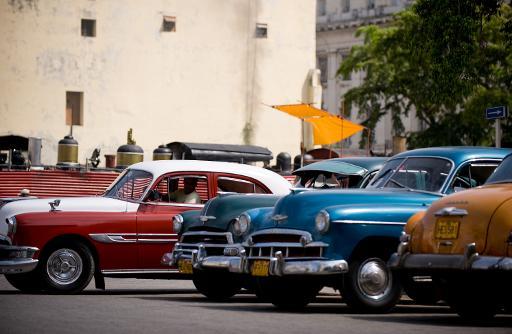
Cuban government also lifted restrictions on private individuals buying new and second-hand cars
Any Cuban citizen or foreigner with enough money will now be allowed to import the vehicles through an official agency.
Previously, official permits were required and they were often issued to government officials, doctors and other people with access to the authorities, such as sports stars.
Although Cubans have been able to request bank credits since 2011, barely 500 are reported to have borrowed money.
The government wants to boost that figure as part of its efforts to encourage 1.5 million people to switch from the state payroll to the new private sector.
Some 440,000 people, or about 9% of the Cuban workforce, are now self-employed.
But analysts point out that the new businesses face a big problem – they all chase a very limited number of Cubans with cash to spend.
Cuba’s President Raul Castro has called for “civilized relations” with the US, saying the two countries should respect their differences.
Raul Castro said the US should drop its demand for regime change on the communist-run island.
That would allow both sides to continue work on improving relations, the president said.
Raul Castro’s comments follow a public handshake with President Barack Obama at the memorial ceremony for Nelson Mandela in South Africa earlier this month.
In a rare public speech, Raul Castro said Cuban and American officials had met several times over the last year to discuss practical matters, such as immigration and the re-establishment of a postal service.
That shows that relations can be civilized, Raul Castro explained.
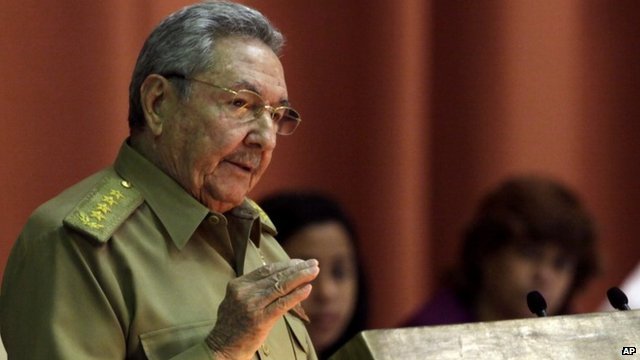
President Raul Castro has called for “civilized relations” with the US
However, he warned: “If we really want to make progress in bilateral relations, we have to learn to respect each other’s differences and get used to living peacefully with them. Otherwise, no. We are ready for another 55 years like the last.”
The US broke off relations with in 1961 after the revolution and maintains an economic embargo against the island.
“We do not ask the United States to change its political and social system, nor do we agree to negotiate over ours,” Raul Castro told legislators at the closing session of the parliament in the capital, Havana.
Raul Castro, 82, took over from his brother, Fidel, in 2006. Fidel Castro had serious health problems and was never able to come back to power. Two years later, he resigned and transferred control permanently to Raul Castro.
He has since carried out a programme of economic reforms, which has helped efforts for relations with the US to be improved.
But critics say the pace of change has been too slow.
“The reform process in Cuba cannot be rushed or it will lead to failure,” Raul Castro warned.
Among the most recent changes announced by Raul Castro is the end of restrictions on private individuals to buy new and second hand cars.
Anyone with enough money will be allowed to order the vehicles from a government dealer.
Until now, only those who were given a previous government authorization were allowed to buy cars in Cuba.
[youtube YtFYgBL2B4U 650]
Cuba has decided to ease restrictions on people buying foreign-made new and used cars, according to state media.
Cubans will no longer need government permits to buy modern cars from state sellers.
Until new regulations in 2011, people could only sell cars built before the 1959 revolution.
Private property has been severely restricted on the Communist country since 1959. The changes are part of a shake-up of Cuba’s struggling economy.
Following reforms adopted two years ago, Cubans can buy and sell used cars from each other, but must request authorization from the government to purchase a new vehicle or a second-hand one from state-controlled retailers.
Priority for the permits was given to people “in positions of benefit to the government”, such as doctors and diplomats.

Cuba has decided to ease restrictions on people buying foreign-made new and used cars
But the Communist Party newspaper, Granma, said the Council of Ministers approved new regulations on Wednesday that “eliminate existing mechanisms of approval for the purchase of motor vehicles from the state”.
As a result, the paper said: “The retail sale of new and used motorcycles, cars, vans, small trucks and mini buses for Cubans and foreign residents, companies and diplomats is freed up.”
People who already have permits are expected to be given priority, however. And buyers will still need to purchase vehicles through state retailers.
Cubans and foreigners will not be able to import their own cars.
The new regulations will be published in the official Gazette in the coming days and become law 30 days later, according to Reuters.
The move is part of a series of reforms driven by President Raul Castro aimed at updating the Cuban economic model.
President Raul Castro has championed limited free-market reforms since taking the reins of power from his brother Fidel in 2008.
[youtube 7eu-JIgHJvk 650]
Heavy rain has lashed Cuba since Friday, flooding streets and leaving at least two people dead.
A number of buildings have collapsed in the capital, Havana, authorities say.
A 54-year-old man and a 60-year-old woman are reported to have died as a house crumbled in central Havana.
Up to 7.8in of rain fell overnight and the Cuban meteorological service has forecast more heavy rain for Saturday, particularly in the western and central regions.
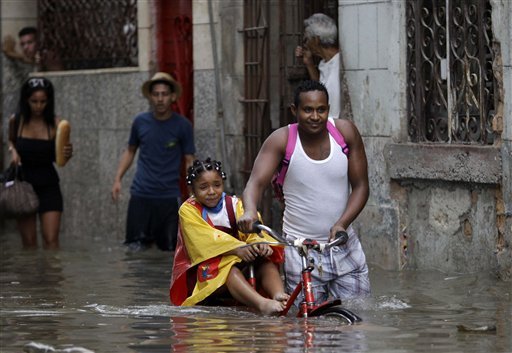
Heavy rain has lashed Cuba since Friday, flooding streets and leaving at least two people dead
Yunior Amesa, the nephew of the two victims of the building collapse, told Associated Press news agency: “It was raining very hard and there was a lot of weight [from the water] up there. They went to bed.”
He says he narrowly escaped because he had to leave the house to go to work.
Many streets in Havana remain submerged, as the authorities assess the damage to other derelict buildings in the city.
Bad weather also led to the closure of the picturesque Malecon seaside boulevard, lashed by stormy waves, AP reported.
The torrential rain is expected to bring flooding to coastal areas in western Cuba and the central region.
Cuban government has ordered the immediate closure of dozens of privately-run cinemas and video-game salons.
The government said the cinemas were never authorized, and that it needed to bring “order” to the management of independent businesses.
Cuba recently relaxed restrictions on the private sector.
But some Cuban entrepreneurs had used restaurant and other types of business licenses to operate backroom movie and entertainment parlors.
“Cinematic exhibition (including 3D rooms) and computer games will cease immediately in whatever kind of private business activity,” read a government announcement in the state-run newspaper Granma.
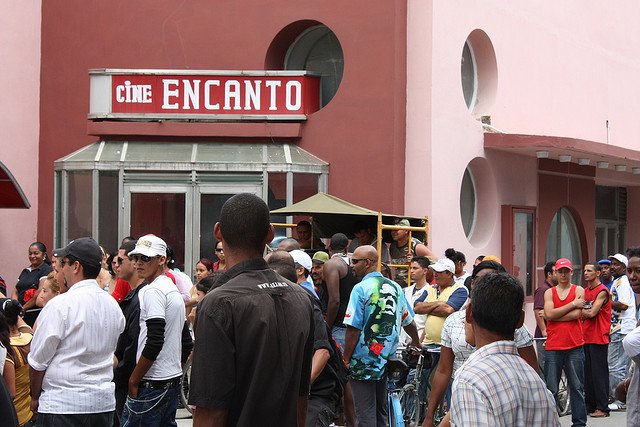
Cuban government has ordered the immediate closure of dozens of privately-run cinemas and video-game salons
It warned of decisive action against any violations of the law, and defended its decision to instill “discipline” in the private sector, adding that this was not “a step backward”.
“Quite the contrary, we will continue to decidedly advance in the updating of our economic model.”
Cuba’s President Raul Castro, who replaced his brother Fidel in 2008, has relaxed some economic restrictions on the set-up of private businesses in the communist island, where the state still employs 79% of the five million-strong labor force.
Raul Castro opened up retail services to “self employment” in the form of nearly 200 licensed activities such as seamstresses, taxis and small restaurants.
But some residents had used these categories to operate cinema and video-game parlors.
The closure is a huge blow to those entrepreneurial Cubans who invested heavily, especially in 3D cinemas, importing equipment at considerable cost from abroad.
There had been hints this crackdown was coming. Cuban Culture Ministry officials talked of the “banality” and “frivolity” of films on offer, mostly produced in America, and out of line, they complained, with the cultural policy of the revolution.
Correspondents say private cinemas had become a popular alternative to poorly-maintained, state-run movie theatres that shy away from showing Hollywood and other mainstream films.
According to government figures, more than 400,000 people in Cuba are self-employed, of whom around 100,000 work as employees of s mall businesses.
[youtube v55PjvvT8oU 650]
 Prev123Next
Prev123Next  Page 2 of 3
Page 2 of 3

























